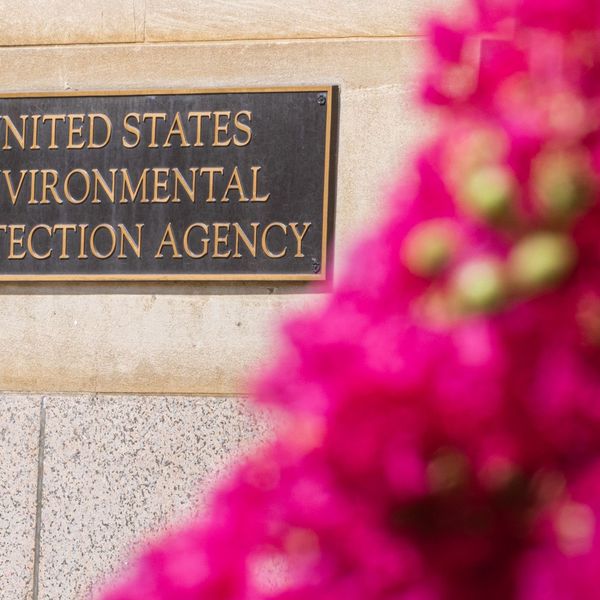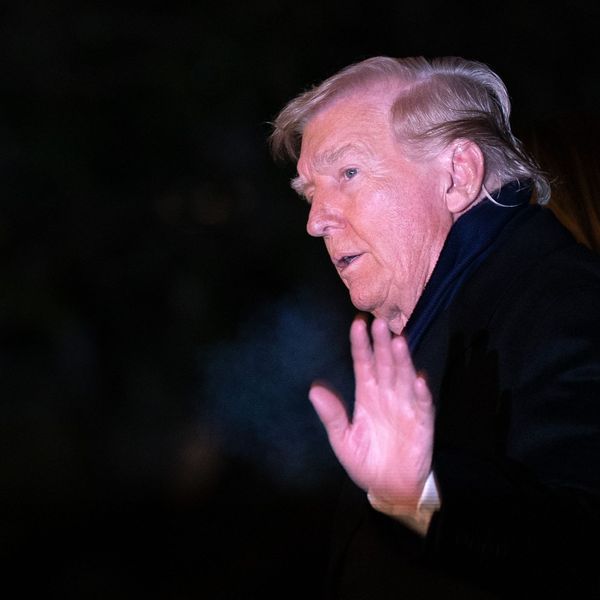Oklahoma Bar Launches Investigation to Determine If Trump's EPA Chief Lied Under Oath
EPA chief told Congress he only conducted official attorney general business on professional email account, but document dump showed otherwise
The Oklahoma Bar Association on Thursday opened an investigation into whether Environmental Protection Agency (EPA) chief Scott Pruitt lied to Congress under oath.
Pruitt has been asked to respond to the inquiry, which will look into possible ethics violations stemming from his confirmation hearing in January, when he testified that he only ever used his professional email account to conduct official business while serving as Oklahoma attorney general.
Following the investigation, the association's Professional Responsibility Commission will determine whether to take disciplinary action against Pruitt.
The probe was launched in response to a formal ethics complaint (pdf) filed by the Center for Biological Diversity (CBD) and University of Oklahoma law professor Kristen van de Biezenbos.
Pruitt's testimony was proven false after a lawsuit filed in February by the watchdog group Center for Media and Democracy forced the release of thousands of pages of his emails, which showed that he had used his personal account to carry out official communications multiple times.
"I'm very pleased the Oklahoma Bar Association has agreed to investigate this matter," said CBD senior attorney Amy Atwood. "Lying to Congress is a serious ethical breach, and it doesn't help that Pruitt's use of private emails reflect potential collusion with the very oil and gas industry he's now supposed to be regulating."
Indeed, the emails exposed a cozy relationship between Pruitt and the fossil fuel industry, including private communications with the American Legislative Exchange Council (ALEC), the corporate-funded conservative lobbying group, and the American Fuel & Petrochemical Manufacturers (AFPM).
One message from the AFPM asked Pruitt to use his position as attorney general to roll back renewable fuel standards that were set by the Obama administration.
Federal rules prohibit the use of private emails for official business because it exposes offices to hacking and can lead to the loss of government records.
"As a law professor and a member of the legal profession, I take the ethical standards very seriously," said van de Biezenbos. "But such rules are only meaningful when they are fully enforced."
An Urgent Message From Our Co-Founder
Dear Common Dreams reader, The U.S. is on a fast track to authoritarianism like nothing I've ever seen. Meanwhile, corporate news outlets are utterly capitulating to Trump, twisting their coverage to avoid drawing his ire while lining up to stuff cash in his pockets. That's why I believe that Common Dreams is doing the best and most consequential reporting that we've ever done. Our small but mighty team is a progressive reporting powerhouse, covering the news every day that the corporate media never will. Our mission has always been simple: To inform. To inspire. And to ignite change for the common good. Now here's the key piece that I want all our readers to understand: None of this would be possible without your financial support. That's not just some fundraising cliche. It's the absolute and literal truth. We don't accept corporate advertising and never will. We don't have a paywall because we don't think people should be blocked from critical news based on their ability to pay. Everything we do is funded by the donations of readers like you. Will you donate now to help power the nonprofit, independent reporting of Common Dreams? Thank you for being a vital member of our community. Together, we can keep independent journalism alive when it’s needed most. - Craig Brown, Co-founder |
The Oklahoma Bar Association on Thursday opened an investigation into whether Environmental Protection Agency (EPA) chief Scott Pruitt lied to Congress under oath.
Pruitt has been asked to respond to the inquiry, which will look into possible ethics violations stemming from his confirmation hearing in January, when he testified that he only ever used his professional email account to conduct official business while serving as Oklahoma attorney general.
Following the investigation, the association's Professional Responsibility Commission will determine whether to take disciplinary action against Pruitt.
The probe was launched in response to a formal ethics complaint (pdf) filed by the Center for Biological Diversity (CBD) and University of Oklahoma law professor Kristen van de Biezenbos.
Pruitt's testimony was proven false after a lawsuit filed in February by the watchdog group Center for Media and Democracy forced the release of thousands of pages of his emails, which showed that he had used his personal account to carry out official communications multiple times.
"I'm very pleased the Oklahoma Bar Association has agreed to investigate this matter," said CBD senior attorney Amy Atwood. "Lying to Congress is a serious ethical breach, and it doesn't help that Pruitt's use of private emails reflect potential collusion with the very oil and gas industry he's now supposed to be regulating."
Indeed, the emails exposed a cozy relationship between Pruitt and the fossil fuel industry, including private communications with the American Legislative Exchange Council (ALEC), the corporate-funded conservative lobbying group, and the American Fuel & Petrochemical Manufacturers (AFPM).
One message from the AFPM asked Pruitt to use his position as attorney general to roll back renewable fuel standards that were set by the Obama administration.
Federal rules prohibit the use of private emails for official business because it exposes offices to hacking and can lead to the loss of government records.
"As a law professor and a member of the legal profession, I take the ethical standards very seriously," said van de Biezenbos. "But such rules are only meaningful when they are fully enforced."
The Oklahoma Bar Association on Thursday opened an investigation into whether Environmental Protection Agency (EPA) chief Scott Pruitt lied to Congress under oath.
Pruitt has been asked to respond to the inquiry, which will look into possible ethics violations stemming from his confirmation hearing in January, when he testified that he only ever used his professional email account to conduct official business while serving as Oklahoma attorney general.
Following the investigation, the association's Professional Responsibility Commission will determine whether to take disciplinary action against Pruitt.
The probe was launched in response to a formal ethics complaint (pdf) filed by the Center for Biological Diversity (CBD) and University of Oklahoma law professor Kristen van de Biezenbos.
Pruitt's testimony was proven false after a lawsuit filed in February by the watchdog group Center for Media and Democracy forced the release of thousands of pages of his emails, which showed that he had used his personal account to carry out official communications multiple times.
"I'm very pleased the Oklahoma Bar Association has agreed to investigate this matter," said CBD senior attorney Amy Atwood. "Lying to Congress is a serious ethical breach, and it doesn't help that Pruitt's use of private emails reflect potential collusion with the very oil and gas industry he's now supposed to be regulating."
Indeed, the emails exposed a cozy relationship between Pruitt and the fossil fuel industry, including private communications with the American Legislative Exchange Council (ALEC), the corporate-funded conservative lobbying group, and the American Fuel & Petrochemical Manufacturers (AFPM).
One message from the AFPM asked Pruitt to use his position as attorney general to roll back renewable fuel standards that were set by the Obama administration.
Federal rules prohibit the use of private emails for official business because it exposes offices to hacking and can lead to the loss of government records.
"As a law professor and a member of the legal profession, I take the ethical standards very seriously," said van de Biezenbos. "But such rules are only meaningful when they are fully enforced."

